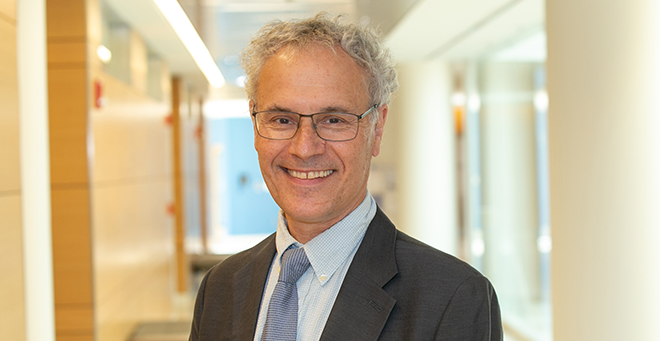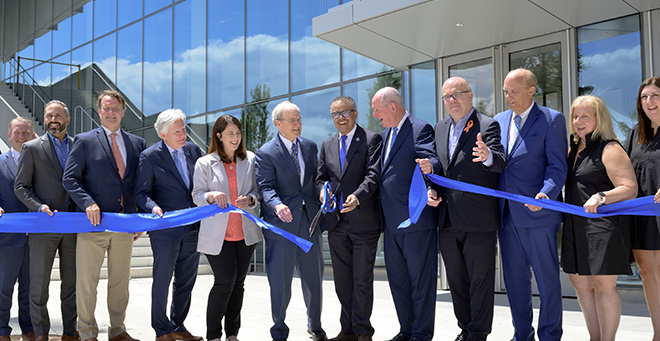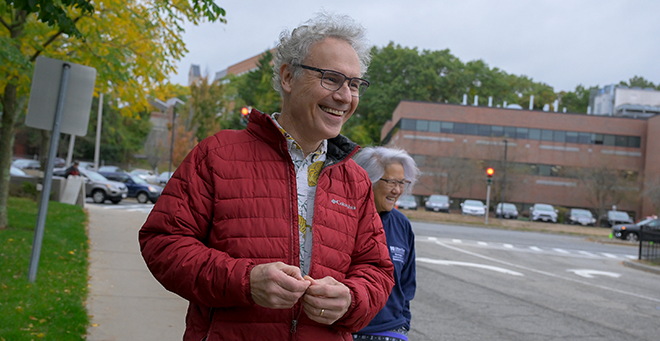
It looked like the Ambros lab would have to delay their scheduled move from Biotech 2 to the new education and research building for a day or two. Its members were busy celebrating.
Early Monday morning, Victor R. Ambros, PhD, the Silverman Chair in Natural Sciences and professor of molecular medicine at UMass Chan Medical School, and Gary Ruvkun, PhD, professor at Harvard Medical School, were awarded the Nobel Prize in Physiology or Medicine for their discovery of microRNA, the very short (approximately 22 nucleotide-long) single-stranded RNA molecules that are now understood to play a critical role in post-transcriptional gene regulation.
Dr. Ambros and his wife, Rosalind “Candy” Lee, senior scientist and first author on the seminal 1993 Cell paper cited by the Nobel Committee, were asleep when the announcement was made at the Karolinska Institute in Sweden.
“I had left my phone downstairs and people kept calling, I guess they started calling anybody with the name Ambros, but they called my son, so he called me,” Ambros told a small group of colleagues who gathered outside his new laboratory to raise a toast with champagne.
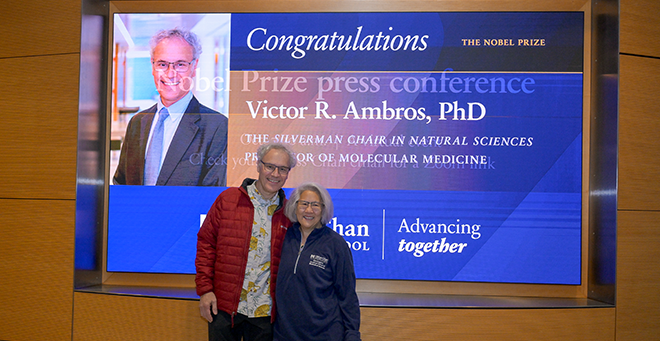
“It’s just wonderful, you feel this love and happiness flowing from everybody,” said Lee. “For us, it was mostly that we said, well, we’ve accomplished something,” she said. “We’ve added to the scientific knowledge. I think that’s all scientists want to do, to have their work be something that people can build on and discover things, and the things that people have been able to do in the microRNA field is just astounding.”
“What we’d really like to do is deflect it to the organism, the wonderful model systems, the C. elegans, you know,” Ambros said. “And point out that this discovery came from basic research funded by the NIH Institute of General Medical Sciences. And you know, at the time we were doing it, there was no particular promise that it should be a broad interest. Really, we were just hoping, and I assume the NIH was hoping that we would just do good work and that it would add, as Candy says, to the scientific knowledge.”
Lee said that the couple hope to be able to help the general public understand and appreciate what scientists do, with the illumination of their work recognized with the Nobel Prize.
“I think it’s important in circumstances like this to remind folks that this is not about something that happened in the past,” said Ambros. “This is about a way that we do in scientific inquiry that’s still working today, every day, in these rooms, here, in these labs on this campus and everywhere else, people are finding surprises about biological systems that they don’t understand and they can’t explain, and then when they investigate them and really get to the bottom of it, new principles emerge, new kinds of molecules, new kinds of machines become discovered. That’s going to keep going indefinitely.”
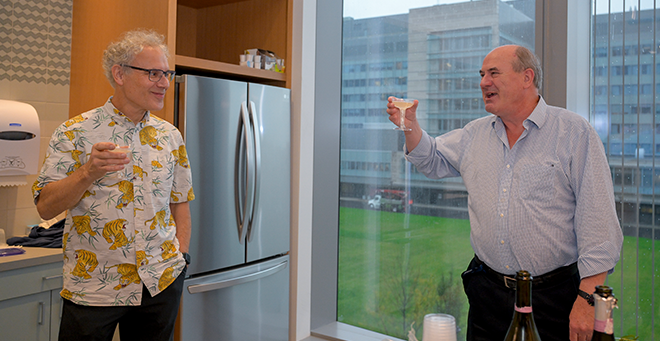
David Guertin, PhD, professor of molecular medicine, said he found out really early Monday morning, before Ambros was notified, because he has a friend in Copenhagen who texted him immediately after the friend found out from the chair of the Karolinska Institute.
“It’s just so amazing to see him finally be recognized and appreciated for his discoveries,” said Dr. Guertin.
Amy Walker, PhD, associate professor of molecular medicine, said, “He’s also a member of the department and he always has time for colleagues and trainees, so we really appreciate it.”
And then, the champagne toasts were raised.
At the press conference in the Albert Sherman Center an hour later, Chancellor Michael F. Collins sent his congratulations via Zoom from Crete, where he is receiving an honorary degree from the University of Crete School of Medicine.
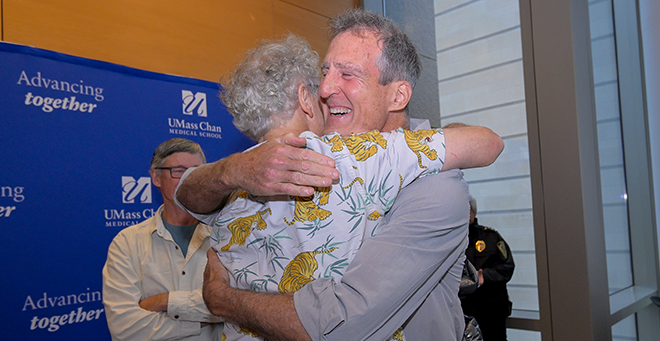
Ambros, wearing his favorite colorful shirt with a tiger print, which his wife had bought for $5 at a thrift shop, reflected on the importance of support from the UMass Chan community and the public that supports the state’s only public medical school.
“I’ve learned that institutions can really, really work and that leadership matters,” said Ambros. “This is an institution that is I think getting right as best as any institution can, for making it possible for people of all sorts to come together and really do science in a way that’s synergistic, where communication and sharing of ideas is the expectation, not the exception.”
Ambros also highlighted the legacy of the "everyday heroes (who) brought us here,” including his father who immigrated from a poor rural community in Poland, befriending a U.S. Army member after being released from a Nazi labor camp, and Lee’s parents who immigrated from China.
He emphasized the importance of public funding for research, highlighting NIH and the state. He said that everyone in Massachusetts should know about the biomedical achievements at UMass Chan Medical School.
“They can take proud ownership of what happens here,” said Ambros.
Meeting families of children with a rare genetic disease that could potentially be unraveled through applications of his work inspires Ambros. MicroRNA shows how “parts of our genome can communicate with other parts of our genome,” he said. The discovery being celebrated has significance for improving human health.
UMass Chan Distinguished Professor Craig C. Mello, PhD was co-recipient of the 2006 Nobel Prize in Physiology or Medicine for his discovery of RNA interference or RNAi. Dr. Mello said Ambros, who mentored Mello in his labs as Mello was finishing his PhD, “sparks all kinds of ideas constantly.”
Mello noted Ambros’ significant role as co-founder of the RNA Therapeutics Institute at UMass Chan Medical School.
“If you’re inspired by the work of Victor and Gary (Ruvken), get involved in biology,” Mello told the audience. “Biology is having an amazing, amazing revolution and so is medicine. They really go hand in hand.”
